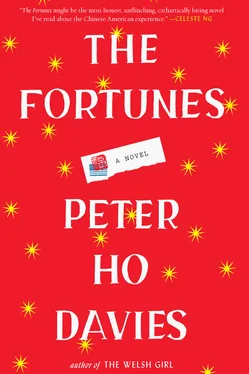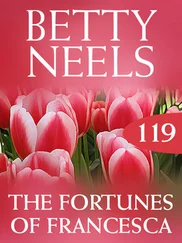Later he stood on the tracks watching the train depart. He listened to each long sigh of the engine as if it were waiting for him to change his mind. And then finally — reluctantly, it seemed — it shrugged into motion, backing slowly down the track, and then faster and faster. A solitary pine, etched against the sky, seemed to point the way.
He watched the locomotive dwindle and finally twist out of sight — the carriage and freight wagon which had trailed them like a queue, he realized belatedly, now going before — and then he followed the great gouts of steam, gashing the sky until he couldn’t distinguish them from the clouds above anymore and there was nothing left of the train except a rainbow-sheened puddle of oil and the glossy coil of a turd resting neatly in the center of a tie.
Crocker, busy winding his watch, had walked past him without a glance when he boarded, as if Ling, his forehead freshly shaven, were invisible. As I might as well be, he reckoned, though not unhappily, among the hundreds of other Chinese lined up for work. He’d thought for so long that he needed to be better to belong. But he’d never really wanted to be special, it seemed to him now, the realization stinging like the cold air on his raw scalp, only the same. The big man had got it wrong. Ling wasn’t proud. What good was pride without women around, after all? Who were you to be proud for? He pictured Crocker, asleep already, probably, his slumbering weight carrying the train careening downhill. You dream your railroad will annihilate distance, bring everything closer, Ling wanted to tell him, but what if it only carries us farther and farther apart? Father and father, he thought with a shudder, wondering ruefully at the apt poverty of English, all those toneless words sounding the same, meaning something different.
The crowd began to shuffle toward the tunnel, but he hesitated for a moment, staring at the empty track, the two silver lines drawing away dully toward a third, the horizon; above it the soaring speck of a bird — an eagle, for sure this time — tawny wings spread stiffly in the sun.
Too late he recalled the gold piece in his waistcoat pocket. He’d left it nestled there when he took the suit off, and now it was gone, down the mountain, as if it had never existed. Someone bumped him and he stumbled into the long, lurching line of men jostling into the darkness.
12.
Crocker had seen the elephant, he’d said. Have I? Ling pondered. Seen it all, or at least his fill? Or was he still hoping for more? It was a question he’d continue to ask himself for years to come, long after his queue had grown back (though he continued to tuck it into his collar to disguise its length).
The men had been slow to accept him at first. “I quit Crocker,” he told them, and they looked about them and said, “How? Why?” But when Strobridge had tapped him for work as a powder man—“Don’t look so scared. Didn’t your lot invent fireworks?”—he’d gained their grudging regard. He grew adept at tamping the charges, paying out the fuse, uncoiling it behind him with a flick of the wrist as if he were sowing rice. The other men let him bathe first, or gave him an extra portion of rice, like an offering, because he went back into the darkness when a fuse failed, as it often did in the damp. He’d get slowly back to his feet and, while the rest watched from cover, as if in ambush, retrace the fuse down the tunnel toward the rockface, looking for a break, all the time fearing that the fuse was still live, the charge about to go off. All under the singular stare of Strobridge, who had lost his own eye in a blasting accident and who stood now as warning to any of them.
He’d not expected to survive the job, nor cared overmuch if he didn’t. But it seemed he was lucky in this. Later he’d work with nitro, and even the bosses would creep softly about him — China-shop Bill backing away, hands up, head bent, so that the men started calling him Kowtow Bill instead. It was as if Ling himself were an unstable compound, ready to erupt at the slightest provocation. He enjoyed the deference, though in truth what he thought of as he stepped gently along with the nitro in hand was how he’d served Crocker, his gliding way of moving around the big man.
Had he seen it all, then? he wondered, watching nitro reduce bosses to obeisance and mountains to dust. Or later, when he helped lay ten miles of track in a single day? Or later still, witnessing Crocker’s old associate Leland Stanford (who had lately revised his opinion of the Chinese upward as “quiet, peaceable, patient, industrious, and economical”) raise a hammer to strike the final golden spike into the railroad… and miss his swing. But perhaps that was no stranger than a man driving a long fang of gold back into the earth — though of course it was swiftly drawn out again and an iron spike inserted in its place.
But even then, apparently, there was more to see. The road completed, work was scarce suddenly, thousands of men unemployed. Ling hired on with the Six Companies as a bone-scraper, working his way back along the line he’d helped lay, exhuming the bodies buried beside the road, gathering their bones to be shipped home to China. It was just another kind of mining: sifting the soil, sometimes with chopsticks, for every one of the 206 bones in a human body, the tiny white pebbles of wrists and ankles, fingers and toes winking from the dirt in his sieve, each to be checked off on a list, each hand and foot bagged in its own pouch and nestled in a box among the other polished bones. Just another kind of laundry too — every bone scrubbed of dirt and flesh, boiled and rubbed with a solution of Chinese wine and water until it shone, cleansed of its mortality.
The boiling was the worst, he found, the soupy smell obliging him to sit upwind. He lit joss sticks to mask it, saying a prayer for the dead men, and for Uncle Ng and Little Sister for good measure.
Just once he turned up a small piece of gold among the bones, as if it too were one of the remains. He rolled the heavy nut of it in his fingers, wondering where it fit in a body. He couldn’t imagine anyone leaving it there, but then it came to him that the dead man must have swallowed it, perhaps over and over to keep it secret. Ling had already pocketed it, but he slipped it back among the small bones of the wrist, giving the bag a little shake until the nugget sank out of sight. He didn’t believe in spirits anymore, but he didn’t want any trouble from them either.
He found the work peaceful, apart from those moments when a train scythed through the air nearby, though he always had warning from the singing rails and took care to cover his work from the eyes of passengers with an unfurled umbrella. It was more awkward in the towns he stopped in along the route to ship the bones back to the coast, a first and last ride on the rails they’d laid for most of the men in his care. Townspeople were suspicious of him, some hostile. When they learned of his work some would say “Good riddance,” while others seemed resentful that their country wasn’t a fit place to be buried. Ling ignored them, though once he reluctantly allowed a local undertaker and once an insistent doctor to accompany him on his doleful work. The undertaker, after taking a spill on the silky carpet of pine needles, sat in the shade drinking and gawping— Here’s me planting ’em and you digging ’em up. Truth is, I always speculated what become of ’em under the dirt —until he fell asleep. The doctor studied the bodies, twisting the ends of his mustache between thumb and forefinger as if turning a key, and offered opinions as to what they’d died from — malnutrition, disease, or violent accident (the latter, including falls and explosions, wasn’t hard to spot) — though to Ling the cause of death was in each case simple: the railroad.
Читать дальше












